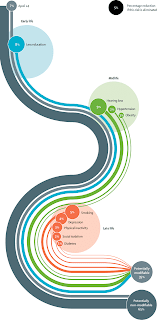Hearing: Beyond the Ears
Hearing: Beyond the Ears
A traditional hearing test evaluates the ears.
The ears are responsible for:
- Collecting sounds,
- Amplifying sounds,
- Organizing sounds, and then
- Transmitting the amplified and organized signal to the auditory nerve
While the ears do the hearing, however, the BRAIN does the
LISTENING! It is once those sound signals hit the nerve that the magic really
happens! The signals travel from the ear to the brainstem, the midbrain, then
the auditory cortices, crossing from one side to the other multiple times and
sending information up and down that chain.n (photo from www.clearliving.com)
The auditory cortex lives in the temporal lobe of the brain
and each side does something different. The left side is responsible for things
related to language and the right for things like tone and patterns. Together
they work so that we can understand.
Understanding happens when we apply meaning to the sounds we
have heard. We compare it to the history of all the sounds we heard before and
determine what they are based on that. Once we understand we have emotional
responses to those sounds and take action.
So what if all that isn’t working?
- What if along that chain from the ear to the temporal lobe there is an unexpected pause?
- What if there is damage to the part of the temporal lobe that helps us derive meaning?
- What if our memory is affected so we can’t associate the sounds with anything we have heard before?
- What if processing speed is slow so we can’t keep up with what we’re hearing?
- What happens when speech is too fast, spoken by someone with an unfamiliar accent or enveloped in noise and our brain can’t pull the important information out to be understood?
Communication breaks down. Learning is inhibited. Fatigue
sets in. Frustration occurs by both the talker and the listener.
Unfortunately, when this happens often enough, there are consequences including depression, anxiety, social isolation, strained relationships, and possibly cognitive decline.
The image below demonstrates how the most in-depth study of risk factors for dementia (conducted by Lin et al. at Johns Hopkins University) found that hearing loss is the single greatest risk factor for dementia, and that the ability to intervene and make a difference is in mid life.
In most hearing practices, assessment stops at the ear. Does
this make sense since we know that the magic really happens after the ear? No!
Some audiologists do tests of all of those processes that help us understand
what we hear which is also great! But what about those brain processes that
help us to understand – memory, processing speed, reaction time?
We now have a way!
Cognivue is a computer-based test that is
better than traditional written tests at detecting the earliest signs of mild
cognitive impairment. It is a quick 6-minute screening test that involves watching
a screen and moving a joystick. It is extremely easy to take and is not
dependent on hearing. It is calibrated to rule out the impact of visual acuity
problems and abnormal hand movements (shaky and/or weak).
The test looks at the following domains
- Memory
- Visuospatial Ability
- Executive Functioning
- Reaction Time
- Processing Speed
It gives us insight into what
happens beyond the ear AND beyond the auditory system to see if you are able to
put all the information together to understand, to communicate, and to learn.
It lets us know whether to consider rehabilitation options beyond the hearing
aids and it provides you and your healthcare team with meaningful information.
After this test is finished, you
will leave with a copy of your results, some tips for maintaining and/or
improving brain health, and an informative letter for your primary care doctor.
Cognitive decline can be at least hastened if detected early. We also know that hearing loss is the highest mitigatable factor for dementia and that it is most sensitive to changes in mid-life. Getting a thorough hearing evaluation and a cognitive screening between the ages of 45 and 50 years can provide a baseline for us to monitor for changes.
Through early detection of and intervention for both hearing
loss and mild cognitive impairment, we are working to improve our patients’
lives from the inside out.



Comments
Post a Comment